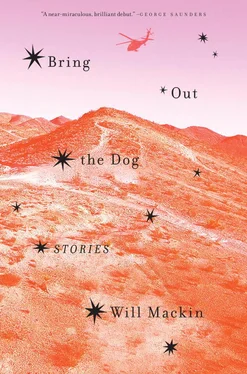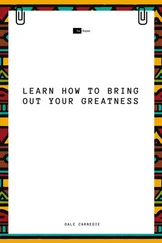Will Mackin - Bring Out the Dog
Здесь есть возможность читать онлайн «Will Mackin - Bring Out the Dog» весь текст электронной книги совершенно бесплатно (целиком полную версию без сокращений). В некоторых случаях можно слушать аудио, скачать через торрент в формате fb2 и присутствует краткое содержание. Город: New York, Год выпуска: 2018, ISBN: 2018, Издательство: Random House Publishing Group, Жанр: prose_military, на английском языке. Описание произведения, (предисловие) а так же отзывы посетителей доступны на портале библиотеки ЛибКат.
- Название:Bring Out the Dog
- Автор:
- Издательство:Random House Publishing Group
- Жанр:
- Год:2018
- Город:New York
- ISBN:978-0-812-99564-0
- Рейтинг книги:5 / 5. Голосов: 1
-
Избранное:Добавить в избранное
- Отзывы:
-
Ваша оценка:
- 100
- 1
- 2
- 3
- 4
- 5
Bring Out the Dog: краткое содержание, описание и аннотация
Предлагаем к чтению аннотацию, описание, краткое содержание или предисловие (зависит от того, что написал сам автор книги «Bring Out the Dog»). Если вы не нашли необходимую информацию о книге — напишите в комментариях, мы постараемся отыскать её.
Bring Out the Dog — читать онлайн бесплатно полную книгу (весь текст) целиком
Ниже представлен текст книги, разбитый по страницам. Система сохранения места последней прочитанной страницы, позволяет с удобством читать онлайн бесплатно книгу «Bring Out the Dog», без необходимости каждый раз заново искать на чём Вы остановились. Поставьте закладку, и сможете в любой момент перейти на страницу, на которой закончили чтение.
Интервал:
Закладка:
That trek across the slick and forsaken field in Khost, for example. Or my heart’s reception of the Taliban’s mounting despair. Or the river, whose water smelled like rust, whose current created its own breeze, and whose eddies trapped phosphorescent galaxies of undissolved fertilizer. That river didn’t appear on any of our maps. So, to anyone not standing on its ill-defined banks or wading out against its wily current, that river didn’t exist. If we were ever going to turn back, this would’ve been the time.
But I followed Hal into that river—up to my knees and then my waist—to a spot about halfway across, where the current felt stronger at my feet than at my chest. The bottom kept shifting, and a dark crease formed on the river’s surface immediately downstream from us. That was where Hal froze.
“We need to move upstream!” I called.
Hal gripped the rope with both hands. “Right!” he shouted, without moving. Then he disappeared below the surface.
Standing my ground, I absorbed Hal’s weight on the tightening rope. Then the bottom gave out, and I went under.
It was as if I’d sunk into a well. Still attached to the rope, I bumped into Hal. The current pushed us together, back to back, holding us submerged. We fought to unhook ourselves while the rope twisted. Hal bucked as if he were trying to break out of a straitjacket. His screams were silent, but I felt them in my lungs, and I watched their silver bubbles rise from his mouth.
Times before, when I’d thought I was going to die—like during that ambush in Marjah, on my first deployment, or, two deployments later, when our helo’s tail rotor was shot off over Shkin—I’d wanted to cringe at the coming end. Instead, I’d looked to Hal and seen him radiating calm, a calm that had transferred to me so completely that I wouldn’t have known the difference had I passed to the other side.
Now Hal had run out of air. He clawed at me in an attempt to propel himself to the surface. In that way, he created enough slack in the rope for me to unclip.
I sank directly to the bottom of the murky hole and kicked off, but fell short of the surface. Sinking again, I drifted downriver. My armor, my weapons, felt weightless in the numbing cold. I floated through Hal’s wake: cascades of shear and compression, acceleration and stall. I looked up at the surface, trying not to panic. In a twist of glowing fertilizer, I saw the Virgin Mary.
Doubters, listen: if she can appear at an underpass in Chicago, if she can appear in the bruise on a woman’s thigh at an ER in El Paso, then she can appear in a whirlpool of diammonium phosphate, spinning on the surface of an unnamed river in Afghanistan.
Light emanated from her warm, benevolent face. Golden roses lay at her feet. She and I communicated telepathically.
“Am I saved?” I asked, bubbles tickling my lips.
“No,” Mary said.
“How come?” I asked.
“Saving you would require a miracle, and you’ve already used yours,” she said, not unkindly.
THE MIRACLE IN question had occurred the morning of Saturday, December 8, 1984, on a football field in Deptford, New Jersey, during a playoff game for the Group III State High School Championship. I was a second-string junior, and not a day had passed since that I hadn’t thought about it, or about the events leading up to it, beginning with dinner at Coach D.’s house the night before the game.
Coach D. lived in Ocean City, New Jersey, in a gray duplex on the bay side of the island, between an ice factory and a grass strip, from which banner-towing Cessnas lifted off in summer. He’d grown up in Ocean City, gone to Ocean City High School, played cornerback for the Red Raiders, and been assistant coach for a decade before becoming head coach. “In all that time,” Coach D. said, during the speech he delivered over a spread of baked ziti prepared by Mrs. D., “I’ve never seen a team this good, this bighearted, this brave. Never one as touched by destiny.” And with that Coach D.’s voice cracked, and he began to weep.
I had to resist the urge to laugh. I looked away and counted backward from a hundred, so as to avoid insulting a man whose only fault had been to stare failure in the face and carry its weight for the rest of us. Luckily, Maz, our team captain, stepped in and said, “Let’s win this one for Coach D.!” And everybody cheered “Coach D.!” in response, over and over.
Amid the ruckus, I laughed without fear of reprisal. Coach D. laughed, too, while wiping away tears. And I took the opportunity to get something else off my chest. To Maz, who was standing ten feet away, I shouted, “I’m in love with your girl!” He didn’t hear me. To Gunner, our quarterback, who was standing right next to me, I hollered, “I’m in love with Maz’s girl!” Gunner yelled back, “Join the club!” Then the cheering died down, and we ate ziti.
Maz was a fullback, the type who preferred to block so that others might score. He was a born leader and an all-around good guy, the likes of whom I wouldn’t encounter again until I met Hal, years later. Maz, like Hal, made me feel as though I was part of something larger than myself. And, like Hal, he made me want to be a better person.
Back then, I had this wooden baseball bat, driven through with heavy nails, that I called the Morningstar. Nights, I’d sneak out the back door of my parents’ house on the mainland and carry the Morningstar along fire roads through the Pine Barrens. This was during the casino boom, when new developments seemed to spring up weekly. Finding one, I’d stroll its winding streets, and I’d admire the houses set back in the woods, with moths orbiting porch lights, the smell of wild honeysuckle, and the tic-tic-tic of midnight sprinklers. Along the way, I’d pass perfectly good mailbox after perfectly good mailbox.
I’d destroy one of those mailboxes with the Morningstar. Then I’d destroy the next mailbox, and the next. And if, between mailboxes, I came across a parked car, I’d bash its taillights and shatter its windshield. And, at the end of all this, I’d look down the street at what I’d done with some satisfaction, feeling as though I’d put in a good night’s work.
The next morning, however, I’d be ashamed. Like the people who I knew were cursing me—waking up to find their mailboxes mangled, their taillights bludgeoned, their windshields caved in—I’d wonder, Who would do such a thing, and why?
Maz’s girl was a cheerleader, of course, and, therefore, present at Coach D.’s house the night before the big playoff game in Deptford. Because she’d helped Mrs. D. in the kitchen, I figured she was the one who’d burned the cheese on top of the ziti just the way I liked it. I reckoned that it was some sort of secret communication between the two of us. Imagining what that might mean made the muscles of my jaw seize with desire.
Her name was Natalie, Nat for short. She was wearing a tiny blue dress and white heels.
After the ziti, everyone drifted into the backyard. Coach D. was already out there, jingling change in his pocket, looking up at Cassiopeia. Seeing him lost in thought made me want to laugh again, which made me wonder what the fuck was wrong with me, again. So I turned around and walked the other way, through Coach D.’s house. Right outside the front door, I ran into Nat, standing on the porch with those legs. She looked cold.
“Can you give me a ride home?” she asked.
“Sure,” I said.
Nat lived on the north end of the island, in a development called the Gardens, where there were no mailboxes. Where, I supposed, letters and packages floated down under little rainbow parachutes. The Gardens had reflecting pools, lemon groves, and footbridges. It had terraces, verandas, and pavilions. As we drove past these things, Nat seemed not to notice. At a four-way stop, she leaned over and kissed me.
Читать дальшеИнтервал:
Закладка:
Похожие книги на «Bring Out the Dog»
Представляем Вашему вниманию похожие книги на «Bring Out the Dog» списком для выбора. Мы отобрали схожую по названию и смыслу литературу в надежде предоставить читателям больше вариантов отыскать новые, интересные, ещё непрочитанные произведения.
Обсуждение, отзывы о книге «Bring Out the Dog» и просто собственные мнения читателей. Оставьте ваши комментарии, напишите, что Вы думаете о произведении, его смысле или главных героях. Укажите что конкретно понравилось, а что нет, и почему Вы так считаете.












